Challenges of Buying a Home with High FHA Loan Interest Rates
July 2, 2023
The Impact of High FHA Loan Interest Rates
- Increased Monthly Payments
High FHA loan interest rates result in higher monthly mortgage payments. This can strain your budget and may limit your ability to afford a home that meets your needs and preferences. - Long-Term Cost
Over the life of your mortgage, the impact of high interest rates can be substantial. You'll end up paying significantly more for your home compared to someone with a lower interest rate. - Reduced Buying Power
High interest rates can limit your buying power, meaning you might not be able to afford the same home or neighborhood you initially had in mind.
Strategies for Dealing with High FHA Loan Interest Rates
- Improve Your Credit Score
One way to secure a more favorable FHA loan interest rate is by improving your credit score. This can be achieved by paying down existing debts, correcting errors on your credit report, and demonstrating responsible financial behavior over time. - Shop Around
Don't settle for the first FHA lender you encounter. Shop around and compare offers from multiple lenders. Interest rates can vary significantly between lenders, and a little extra effort can yield substantial savings. - Consider Other Loan Options
While FHA loans are a popular choice, they are not the only option available. Explore conventional loans, USDA loans, or VA loans if you qualify, as they may offer more competitive interest rates. - Make a Larger Down Payment
Increasing your down payment can help mitigate the impact of high interest rates. It reduces the amount you need to borrow, resulting in lower monthly payments and less interest paid over time. - Lock in Your Rate
When you find an FHA loan with an interest rate you're comfortable with, consider locking in that rate. This protects you from rate increases during the application process. - Refinance When Possible
Once you've secured your FHA loan, monitor the market for opportunities to refinance when interest rates are more favorable. Refinancing can help you reduce your interest rate and lower your monthly payments.
RELATED VIDEOS:
Annual Income Requirements for FHA Loans
Good Credit History Helps Get FHA Loans
Stay Informed About Your Mortgage Closing Costs

FHA Loan Articles
April 30, 2025 In a previous post, we discussed why FHA borrowers should carefully consider whether paying for discount points truly serves their best interests, focusing on factors like short-term homeownership, opportunity cost, FHA mortgage insurance, and the prevailing interest rate environment. Discount points are an option for borrowers willing to pay a fee to lower the interest rate by a set amount. This is not right for all borrowers, and you don't want to pay for points you won't benefit from during the loan term.
April 29, 2025Are you considering buying a home with an FHA loan? You'll likely talk to your participating lender about FHA loan "discount points" – fees you pay upfront for a lower interest rate on your mortgage. The idea behind discount points is a straightforward exchange: you spend money today to reduce your interest rate. Typically, one point equals one percent of your total FHA loan. In return, your interest rate might decrease by an amount you and the lender agree upon.
April 28, 2025Home loans have various expenses that aren't apparent to a new borrower until much later in the process. What do you need to consider when making your home loan budget? It might not be complete without addressing some of the issues we cover here.
April 23, 2025 While the prospect of lower interest rates or more favorable loan terms can be enticing, there are situations where waiting is the better option. Refinancing without carefully considering your current financial circumstances is never a good idea, but careful planning in the current financial environment is even more important.
April 22, 2025First-time home buyers worry about loan approval, but there are important steps to take to increase the likelihood that the lender will approve their application for the loan or pre-approval. What do you need to know before you choose a lender?







